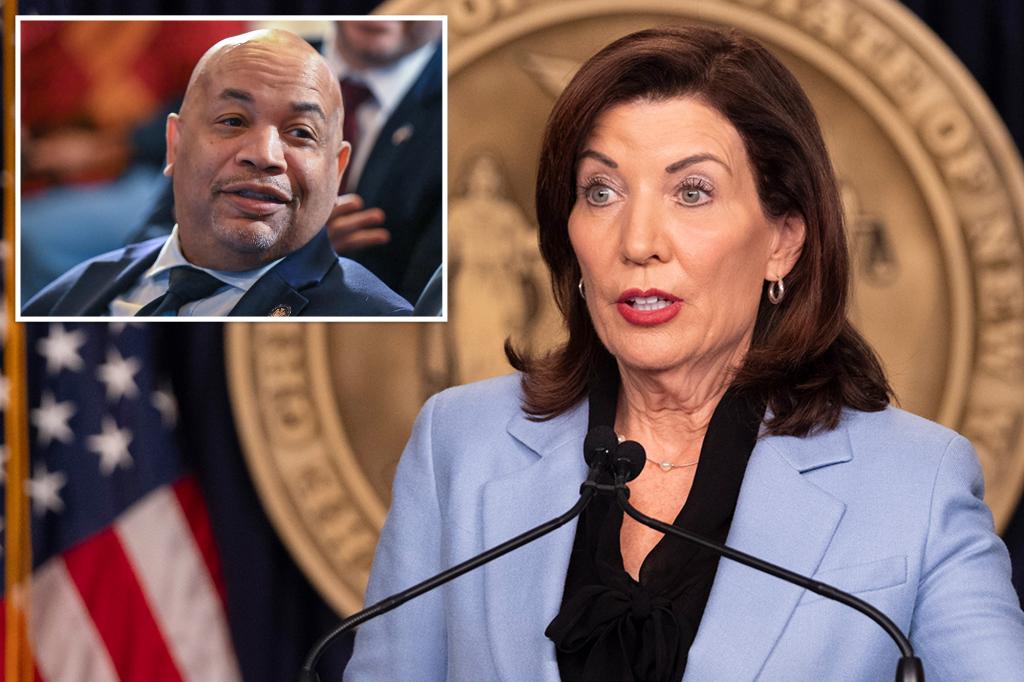World
Kathy Hochul’s planned ‘rebate checks’ hit roadblock as critics want cash spent elsewhere

Gov. Kathy Hochul’s $3 Billion Plan to Send Checks to Middle-Income New Yorkers Faces Pushback from Democrats
New York Governor Kathy Hochul’s proposal to send $300 checks to middle-income New Yorkers has sparked a heated debate within her own Democratic Party. The plan, which would cost a staggering $3 billion, aims to provide financial relief to single individuals earning under $150,000 and families making less than $300,000 annually. However, many state lawmakers are questioning the efficacy and wisdom of this approach, especially given the hefty price tag. Critics argue that the plan does little to address the root causes of the state’s high cost of living and could be better spent on long-term solutions.
Critics Argue the Plan Addresses Symptoms, Not Root Causes
Democratic lawmakers are voicing concerns that Hochul’s plan is a Band-Aid solution that fails to tackle the underlying issues driving New York’s expensive lifestyle. State Senator James Skoufis (D-Orange) expressed his reservations, stating, “The checks address a symptom of the problem rather than the problem itself. We need to address the fundamental issues that drive the high cost of living in New York—these checks fail to do that.” Assemblyman Harvey Epstein (D-Manhattan) echoed similar sentiments, suggesting that the funds could be better utilized for initiatives like pre-K and afterschool programs or doubling the school tax relief credit (STAR).
Alternative Ideas for the $3 Billion Allocation
The debate over how to allocate the $3 billion has opened the door to alternative proposals from Democratic lawmakers. Skoufis proposed doubling the STAR credit, while Epstein emphasized the importance of investing in education and childcare programs. Other ideas include paying off the state’s $6 billion debt to the federal government for pandemic-era unemployment insurance. Assembly Speaker Carl Heastie (D-Bronx) highlighted the need to address this debt, which currently burdens small businesses. Heastie argued that reducing this debt could also allow for increased benefits for unemployed workers, providing them with greater financial stability.
Democrats Divided Over the Plan’s Merits
While some Democrats are hesitant to openly criticize the proposal, others are backing it enthusiastically. Assemblyman David Weprin (D-Queens) acknowledged the political appeal of sending checks to constituents, stating, “I think people generally don’t mind getting money in the mail, and I don’t think my constituents are going to object to it.” However, Weprin also admitted that the $3 billion allocation is a one-time expenditure, limiting its long-term impact. Despite these reservations, he remained open to exploring other ideas, emphasizing that “everything’s on the table.”
Business Community Urges Caution on Spending
The business community is also weighing in on the debate, urging policymakers to prioritize paying off the state’s $6 billion unemployment insurance debt. Paul Zuber, executive vice president of the Business Council of New York State, warned that failing to address this debt could pass additional costs onto businesses and taxpayers. Zuber emphasized, “We will never be against government giving back money to consumers, but we hope people realize that this debt ultimately costs taxpayers because it’s being passed on to businesses.”
Hochul Stands Firm on the Plan
Despite the pushback, Governor Hochul remains committed to her proposal. She defended the plan by highlighting its immediate benefits to middle-income families, particularly in light of rising inflation and household expenses. “If you don’t think that means a lot to someone, walk into a grocery store and say, ‘How would you feel if you had $500 more in your pocket for this grocery bill?’ It means a lot to people,” Hochul remarked. Her stance reflects a calculated political move, as the proposal aligns with her re-election campaign next year. While the debate continues, the fate of the $3 billion plan hangs in the balance, with lawmakers weighing short-term relief against long-term structural reforms.